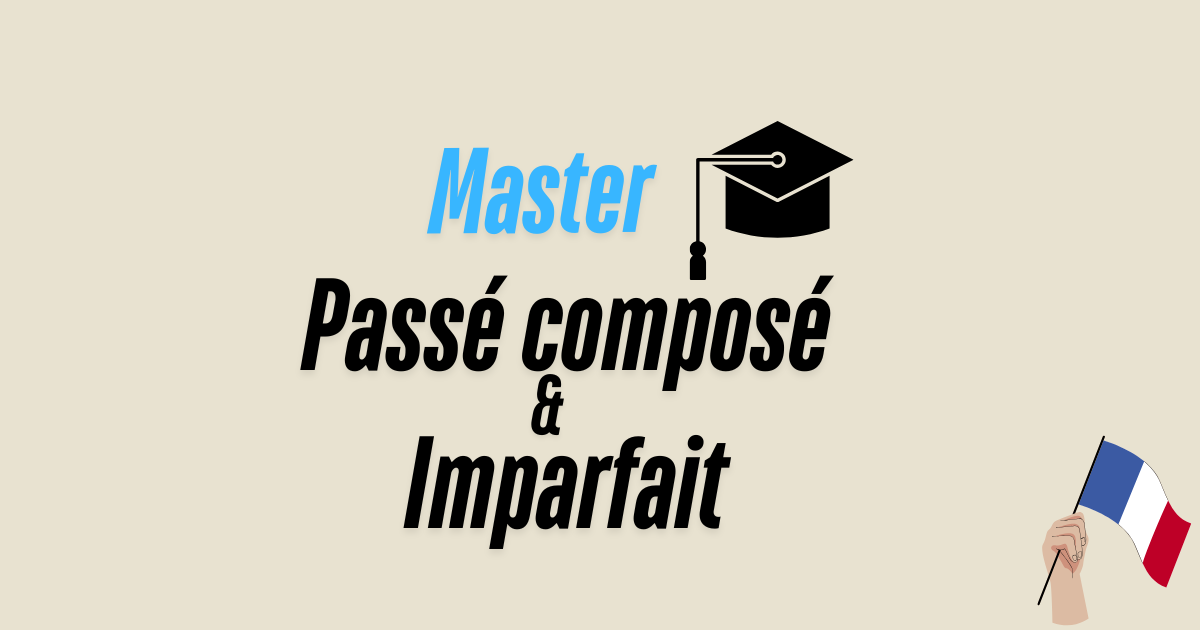Mastering the Use of Passé Composé and Imparfait in French: Common Mistakes and How to Avoid Them
Introduction
Navigating the intricacies of French verb tenses, particularly the passé composé, and imparfait, is a crucial step toward achieving fluency. These two tenses are essential for expressing past events, but they serve distinct purposes. This guide will help you understand their differences, avoid common pitfalls, and apply them correctly in conversation.
Section 1: Understanding the Basics—Passé Composé vs. Imparfait
Passé Composé:
- Purpose: The passé composé is your go-to tense for discussing specific, completed actions or events. It emphasizes what happened at a particular moment.
- Example: J’ai mangé une pizza hier. (I ate a pizza yesterday.)
- When to Use: Ideal for recounting events that occurred at a specific time or for actions that interrupt an ongoing event.
Imparfait:
- Purpose: Use imparfait to describe ongoing, habitual, or background actions in the past. This tense sets the scene and describes situations as they were.
- Example: Quand j’étais petit, je jouais dans le parc. (When I was little, I used to play in the park.)
- When to Use: Perfect for giving background information, describing a scene, or talking about actions that happened over an extended period in the past.
Section 2: Common Mistakes and How to Avoid Them
Mistake 1: Confusing Passé Composé with Imparfait for Habitual Actions
- The Problem: It’s common to mistakenly use passé composé for habitual actions, but these situations actually call for imparfait.
- Incorrect: Tous les dimanches, j’ai joué au foot. (Every Sunday, I played soccer.)
- Correct: Tous les dimanches, je jouais au foot. (Every Sunday, I used to play soccer.)
- How to Avoid It: Think of imparfait as the tense that sets the scene or describes regular activities. For repeated actions, imparfait is your best bet.
Mistake 2: Using Imparfait Instead of Passé Composé for Completed Actions
- The Problem: Overusing imparfait for actions that are clearly completed can lead to confusion.
- Incorrect: Il pleuvait, alors je rentrais chez moi. (It was raining, so I was going home.)
- Correct: Il pleuvait, alors je suis rentré chez moi. (It was raining, so I went home.)
- How to Avoid It: Use passé composé when describing events with a clear beginning and end or one-time actions in the past.
Mistake 3: Misusing Tenses for Interrupted Actions
- The Problem: Confusing ongoing actions with interruptions is a common mistake. The background action should be in imparfait, while the interruption takes passé composé.
- Incorrect: Je lisais un livre quand le téléphone sonnait. (I was reading a book when the phone was ringing.)
- Correct: Je lisais un livre quand le téléphone a sonné. (I was reading a book when the phone rang.)
- How to Avoid It: Remember, ongoing actions are in imparfait, and interruptions are in passé composé.
Mistake 4: Overusing Passé Composé for Descriptions
- The Problem: Using passé composé for descriptions is another common error. Descriptions of people, places, or situations need imparfait.
- Incorrect: Elle a été belle quand elle a été jeune. (She was beautiful when she was young.)
- Correct: Elle était belle quand elle était jeune. (She was beautiful when she was young.)
- How to Avoid It: Use imparfait when describing past states, emotions, or physical attributes.
Mistake 5: Ignoring the Context of the Story
- The Problem: Failing to consider the overall context can lead to mixing up the tenses, making your story unclear.
- Incorrect: Hier, je me suis levé tôt. Il faisait beau et j’ai bu du café. Puis, je suis allé au travail, et tout le monde travaillait dur. (Yesterday, I got up early. It was nice out, and I drank coffee. Then, I went to work, and everyone was working hard.)
- Correct: Hier, je me suis levé tôt. Il faisait beau, et j’ai bu du café. Puis, je suis allé au travail, et tout le monde travaillait dur. (Yesterday, I got up early. It was nice out, and I drank coffee. Then, I went to work, and everyone was working hard.)
- How to Avoid It: In storytelling, use passé composé for specific events and imparfait for descriptions and ongoing situations.
Section 3: Tips for Mastering Passé Composé and Imparfait
- Focus on the Nature of the Action:
- Passé Composé: Ask yourself if the action was a one-time event with a clear start and end. If so, use passé composé.
- Imparfait: Use imparfait for actions that were habitual, ongoing, or set the background.
- Learn Key Signal Words:
- Passé Composé: Look out for indicators like hier (yesterday), une fois (once), soudain (suddenly).
- Example: Hier, j’ai vu un film. (Yesterday, I saw a movie.)
- Imparfait: Look for phrases like tous les jours (every day), souvent (often), quand j’étais jeune (when I was young).
- Example: Quand j’étais jeune, je jouais souvent au tennis. (When I was young, I often played tennis.)
- Passé Composé: Look out for indicators like hier (yesterday), une fois (once), soudain (suddenly).
- Practice with Real-Life Scenarios:
- Imagine recounting your day. Use passé composé for specific events and imparfait for descriptions.
- Example: Ce matin, je suis allé au marché. Il faisait beau, et il y avait beaucoup de monde. (This morning, I went to the market. It was nice out, and there were a lot of people.)
- Imagine recounting your day. Use passé composé for specific events and imparfait for descriptions.
- Listen to Native Speakers:
- Pay attention to how native speakers use these tenses in different contexts. Movies, podcasts, and everyday conversations are great resources for this.
Conclusion
Mastering the use of passé composé and imparfait is key to telling stories and describing past events like a native speaker. By recognizing common mistakes and practicing in real-life scenarios, you’ll gain confidence in choosing the right tense. Keep practicing, and soon, you’ll be narrating the past effortlessly in French!




